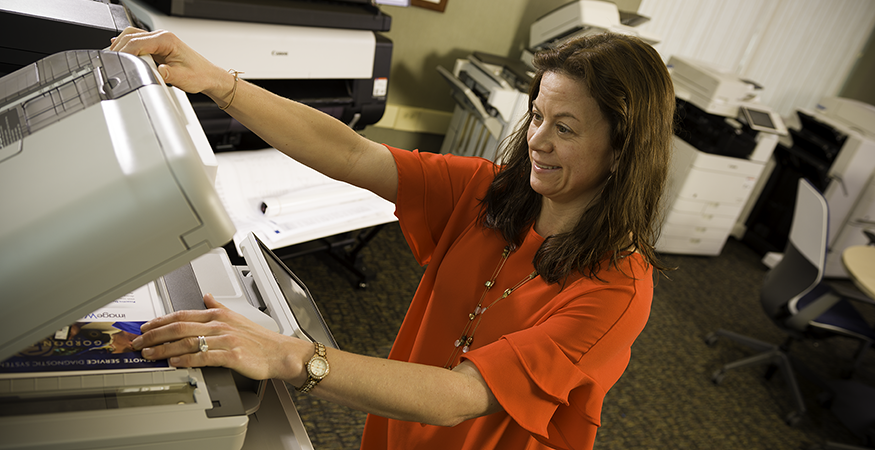No one notices the office printer…until something goes wrong.
A Managed Print Service (MPS) is the most efficient and cost-effective way to manage and maintain a printer and copier fleet. When done right, an MPS program will keep copiers and printers running so well you might forget they are even there.
If your printers are getting old or causing slowdowns, it might be time to consider a managed print strategy. How do you know whether a MPS program is right for your business? It starts by recognizing the seven glaring signs you need a Managed Print Services implementation strategy.
- Your Printers Aren’t Secure
- Supplies Aren’t There When You Need Them
- You Have Too Many Printers
- Your Billing Is Too Complicated
- You Lack Real-Time Analysis, Data and Strategy
- Your IT Department Spends Too Much Time on Printers
- Your Machines Experience Frequent Downtime
1. Your Printers Aren't Secure
Managed Print Service providers offer improvements to your business’ security, both in terms of devices and documents. Proper print management helps ensure your company is up to date on associated laws and requirements, so you no longer have to worry about compliance as it relates to your printers’ data security.
When done right, a Managed Print Services solution also offers device authentication and document encryption, which prevents unauthorized access to documents and networks. Swipe-to-print technology, authorized document release and more help ensure that confidential information won’t end up in the wrong hands — whether from a cyber threat or internally when someone retrieves a document from the printer that was intended for someone else’s eyes only. Remote monitoring and firmware updates further help to secure your printing environment.
2. Supplies Aren't There When You Need Them
An obvious benefit of a Managed Print Service is the cost savings on supplies like toner. A good managed print services provider will audit your print volume and provide a complete cost analysis showing where a company can save on printing expenses. A great MPS provider can provide automation solutions like just-in-time delivery of toner and materials so companies don’t have to waste money and storage space stocking print supplies.
For example, Sauk Prairie Healthcare operates a hospital and three surgical specialty practices in Prairie du Sac, Wisconsin as well as four primary care clinics in the surrounding communities. Troyka-TC’s (GFC) analysts helped eliminate unnecessary machines and standardized select models of copiers and printers.
Additionally, the organization adopted GFC’s just-in-time delivery system, allowing them to eliminate stockpiled supplies and receive toner just as the machines need it. In fact, the company was able to empty out a 4-foot pile of old toner and supplies that had been gathering dust in the main office for years.
RELATED: Everything You Needed to Know About Toner and Ink
3. You Have Too Many Printers
A print management strategy should take inventory and analyze your current printer fleet. If done right, this analysis will likely lead to a reduced fleet and more efficient use of your existing machines.
For example, Velocity Urgent Care had 30 print devices for 8 locations before reaching out to GFC. Today the company has doubled its number of locations to 16 with a total of just over 40 machines. They were able to do more with less equipment by standardizing with new, more powerful machines. The new multifunction printers even offer standardized features like lockable trays to protect confidential patient information and comply with HIPAA laws.
RELATED: 5 Ways to Create HIPAA Compliant Printing
4. Your Billing is Too Complicated
The days of costly printer repairs and replacements are over as soon as you implement print management. MPS makes it possible to track hardware costs and make them predictable so that unexpected hardware and repair bills are a thing of the past. And instead of buying hardware, you can lease it. In this way, you’ll know how much you will spend every month, allowing for a steady, simple budget and consistent payments.
5. You Lack Real-time Analysis, Data and Strategy
One of the coolest things about the managed print implementation process is the ability to conduct real-time analysis. Regular data reports enable you to tweak workflows, readjust hardware requirements and ensure that your team is using resources effectively.
Consider Cardinal Stritch University, which had more than 300 printers and copiers but had very little control over how they were used. Troyka-TC began a phased deployment to consolidate over 120 multifunction printers and 200 desktop printers down to 57 multifunction printers and 40 single-function printers.
Just as importantly, GFC put new controls in place to help lower printing costs. The school already used PaperCut software to optimize printing and manage its print fleet, but had not been able to use advanced document management features or even include Mac users. Those issues are resolved and, thanks to GFC’s just-in-time delivery, the University is using 20% less toner and supplies.
6. Your IT Department Spends Too Much Time on Printers
Your IT department is probably overworked and continually being pulled in different directions. By implementing a managed print strategy, your IT department can go back to focusing on their everyday tasks and become more available and accessible to your employees. IT departments really can't afford to be troubleshooting printing issues or equipment breakdowns. They have more pressing projects and issues that they need to focus on.
7. Your Machines Experience Frequent Downtime
When working right, MPS will ensure your printers and multifunction devices are nearly invisible. That’s because paper-feed problems, ink and toner shortages, driver problems, and breakdowns are rare and remedied quickly if they do appear. A good MPS provider will remotely monitor devices and offer preventative maintenance to head off problems down the road while ensuring supplies are there when you need them.
In the end, the biggest sign of a successful managed print services implementation plan is that no one really notices the printers and copiers. When done right, machines are serviced quickly and supplies are delivered before you run out.
Wondering whether your print environment is hurting your productivity and bottom line? Or maybe you're considering going to bid for a RFP for Managed Print Services but you're not sure where to start? Download our free Office Printer Checklist below for a self-audit of your print environment. The results might surprise you.
To learn more, or for a more thorough free print assessment, reach out to talk with the managed print experts at the Troyka-TC today.










